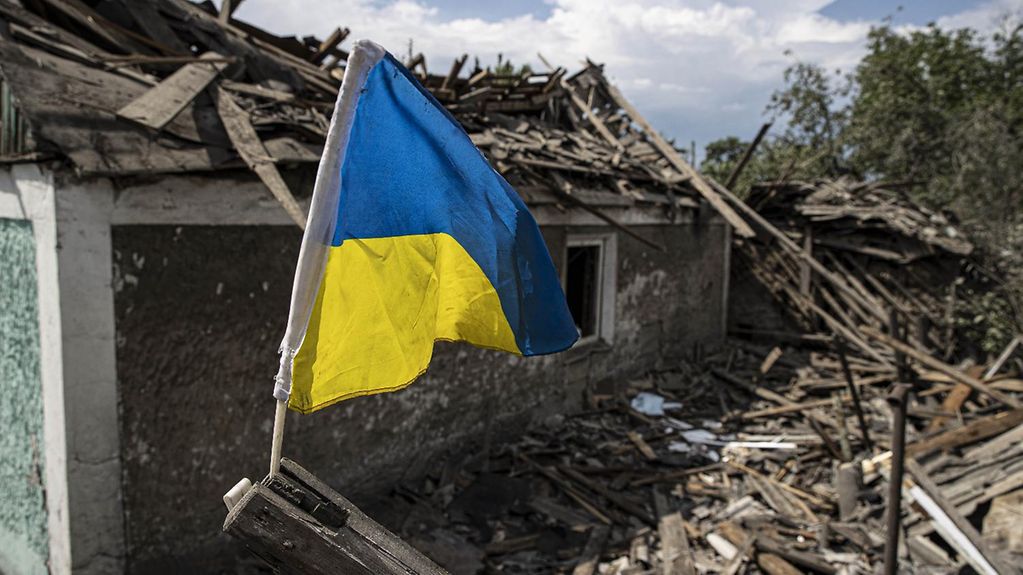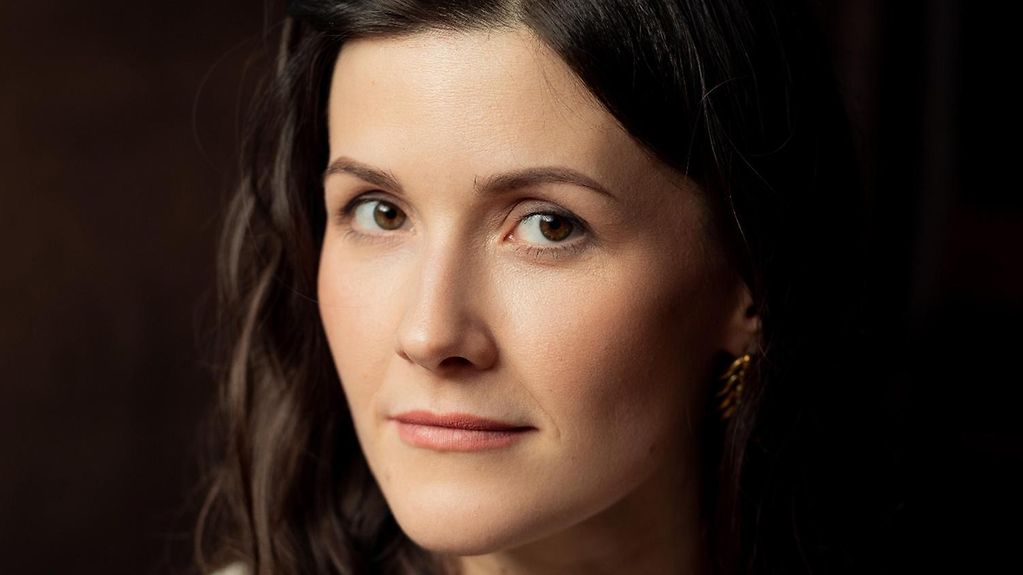Interview with Executive Director of the Aspen Institute Kyiv
One of the weapons being used by Russia in its war against Ukraine is disinformation. By selectively spreading misleading and false information, Russia is being deliberately deceptive and seeking to influence public opinion. In this interview, Yuliya Tychkivska of the Aspen Institute Kyiv describes why Russian disinformation poses a threat to her country, what narratives Russia is spreading, and how she and her fellow campaigners are countering this targeted misinformation.
8 min reading time

“One of the disinformation aims is to destroy everything that civil society tries to build“, says Yuliya Tychkivska of the Aspen Institute Kyiv.
Photo: picture alliance/Anadolu Agency/Metin Aktas
You are working from the city of Kyiv right now. To what extent can Aspen Kyiv carry on working?
Yuliya Tychkivska: Our team partially stayed and worked in Kyiv, even on the most difficult days of the full-scale Russian invasion. As a mother, I have to take care of the safety of my children. So, during the first days of the war, my three kids under six years old and I had to leave Ukraine. Some of my colleagues and millions of Ukrainians were forced to do the same. During three months of the war, I also traveled a lot to promote Ukraine and help Ukraine prevail. We continue to work and fight.
Today, the main focus of the Aspen Institute Kyiv is to contribute to the victory of Ukraine. First of all, we are focusing on international activities. Aspen Institute Kyiv has impressive International Partners in 13 countries and 7 of those are in Europe. It also includes Aspen Institute Germany. Together we created a dialogue platform for Ukrainian leaders and international representatives for sharing first-hand information about the Russian-Ukrainian war, and discussing ways of supporting Ukraine. Also, being a non-partisan platform for leadership dialogue we engage leaders of Ukrainian society to think and discuss issues related to governance, national identity etc.
My country is fighting for democratic values, European peace and paying a very high price for it. We are grateful to our friends, their communities, and everyone who stands with Ukraine.
The Aspen Institute is a US think-tank based in Washington, D.C. that maintains an international network including branches in Germany and Ukraine. It regards itself as a non-partisan, private, non-commercial think-tank which seeks to address the world’s most complex problems. The Executive Director of the Aspen Institute Kyiv is Yuliya Tychkivska, a Ukrainian civic activist.
Aspen Institute describes its mission to address some of the world’s most complex problems. Is disinformation one of them, and if so, why?
Tychkivska: It is crucial to understand the ultimate goal of disinformation. It is used to create a distorted picture of reality to confuse and divide societies. What are the ends that propagandists are trying to achieve? It is distrust of each other that inevitably leads to social tensions, conflicts, and consequently to stagnation and decline in the countries that become the target of disinformation. The worst for these societies — the better for propagandists and their employers. It is the formula they are guided by. In contrast, Aspen Institute Kyiv, like other Aspen Institutes of the world, seeks to create a good society. For us, it is a goal and for them something that should never happen. From my perspective, disinformation is one of the world’s most serious problems. We all have to work to solve it.
How is disinformation a hazard to civil society?
Tychkivska: Mutual trust and respect to human rights, transparency and unity are the foundations of civil society. Disinformation, its creators and beneficiaries are completely in opposition to these values. One of the disinformation aims is to destroy everything that civil society tries to build. Therefore, NGOs often become targets for propaganda attacks too.
Working in Kyiv and facing the Russian war: what sort of Russian disinformation do you observe?
Tychkivska: Russian propaganda in Ukraine tries to split our society which is more united than ever. They are trying to create a picture of a world where both the government and Western partners have left us alone in the war. Everyone is lying, betraying and holding a stone behind their backs — these are the ideas that Russian propaganda is trying to install among Ukrainians. However, we see that almost everyone in the world supports Ukraine.
In addition, Russian propaganda is trying to manipulate history. At the same time, Russian propaganda rarely talks about the future. They could offer nothing but a return to the Soviet Union where everything seemed to be calm. On the other hand, in this era, there was the Holodomor (artificial famine, genocide), massive poitical repressions and obvious restrictions of basic freedoms.

Yuliya Tychkivska, Head of Aspen Kyiv.
Photo: Aspen Institute Kiew
What narratives do Russia use?
Tychkivska: In the first days of the war, the main narrative of Russian propaganda in Ukraine was the irreversibility of our defeat. Russian propaganda spoke about the destruction of all Ukrainian aircrafts, and the unpreparedness of the Armed Forces and Territorial Defense units to defend Ukraine. The heroism of our Armed Forces and active engagement of civil society debunked all these myths. Now, one of the narratives of Russian propaganda is the irreversible loss of territories that have been occupied by Russian troops. I am sure we will debunk this too with the help of the civilized world. As I noted in the previous answer, Russia is also trying to convince Ukrainians of the insincerity of Western support. However, we are confident in our partners and they can trust us completely.
If we talk about the Western world, one of the actual narratives of Russian propaganda is to contrapose aid to Ukraine with the support to vulnerable citizens of supporting countries. Such cases can be found in the Moldovan or Romanian segments of social networks. And in general, the Russian propaganda machine is trying to discredit Ukrainian refugees.
Russians are also trying to create an image of Ukraine as a “Nazi state”. In reality, Nazi and communist ideologies as well as their symbols are officially prohibited in Ukraine.
In which way does it influence or impair your work?
Tychkivska: We are working with leaders of Ukrainian society. They are mature and strong personalities. Therefore, it is quite difficult to brainwash them. But Russian propaganda is a great challenge for all of us, distracting time and resources. Russia is constantly trying to distort reality not only for Ukrainian society but also in countries that support us, mobilizing influencers in the political establishment there. Strategically, it shifts our focus from social development to resistance towards hostile and unfriendly ideas or positions. Let's say that instead of focusing on improvement of governance, we should spend time of our leadership community to address propaganda messages.
Which channels do the senders use – and who are they?
Tychkivska: Russians try to use all possible channels. Traditional media that were used by the Russian propaganda machine in Ukraine have mostly been blocked. One of the main sources that they use now are anonymous Telegram channels. They disguise themselves as Ukrainian Telegram media but work with Russian narratives and wording. Russia also has a network of so-called opinion leaders in Ukraine. They have been poisoning the Ukrainian information space with Russian narratives for years. In addition, Russians use a wide network of fake accounts on other social media.
In Germany and other EU countries, Russian propagandists also have a wide range of tools. We fully support the decision of the German media regulator to ban the broadcasting of the Russian propaganda channel Russia Today Deutsch. We also support YouTube’s decision to block Russia Today’s accounts in the European Union. But frankly speaking, it had to be done much earlier and there are still dozens of Russian media that pretend to be European and continue to spread disinformation. There are still thousands of Russian fake accounts. There is still a lot of work to do.
Is Russian disinformation a special kind of disinformation?
Tychkivska: From my point of view, the main feature of Russian propaganda is its totality: everything that happens, here or there, should become a subject for distorted interpretation by any means. They create platforms that work on the classic 60/40 propaganda principle. Most of the reports are relatively neutral and only a few are propagandistic. Often such information is presented as something that the government hides from society, promoting conspiracy theories. They creatively appeal to the emotions and vulnerabilities of each specific society. For external audiences Russia presents itself as a victim of global injustice, inspired by the West.
Russian propaganda that is aimed at the domestic consumer installs quite the opposite narrative. That is about greatness and omnipotence of the Russian state and the people. The Western world is presented as existentially hostile and deeply perverted. Propagandists create such incredible fakes about Ukraine and the Western World when it is hard to even imagine that someone came up with it on purpose. The creation of bio laboratories, the breeding of birds that specifically infect Russians with the coronavirus, the rampant Nazism in Ukrainian cities and dozens of other crazy ideas — these things may sound like a bad joke to you but Russia lives in this reality today. For all that, the Russian government spends billions of rubles to finance state media alone. These costs have increased many times since the start of a full-scale invasion of Ukraine. Russian mass media got 17,4 billion rubles (289 Mill. Euro) from the state budget in January-March 2022. During the same period of the last year, 5,4 billion rubles (90 Millionen Euro) were spent for state media.
The mission of the Aspen Institute is not only to address some of the most complex problems in the world but also to help solve them. What are your means against Russian disinformation?
Tychkivska: One of the significant parts of the Aspen Institute Kyiv mission is to foster a culture of dialogue. When propaganda tries to brainwash you, dialogue helps to hear all rational arguments, to learn facts and then to make a decision. If we talk not only about Aspen Institute Kyiv, I am sure that the crucial weapon against Russian propaganda is to spread objective and truthful information. Moreover, to do everything possible to isolate propaganda outlets from the civilized world where people used to trust to media.